School of Social Work News
Pages
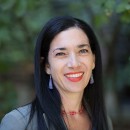 Erin Martinez-Gillard Discusses Sexual Health Education with Crazy Wisdom Journal
Erin Martinez-Gillard Discusses Sexual Health Education with Crazy Wisdom JournalLecturer Erin Martinez-Gillard spoke with Crazy Wisdom Journal about sexual health education and effective ways to talk about sex and relationships with young people. “Creating an open door for questions and conversations is imperative. This is never, in any role, a one-time Q&A,” said Martinez-Gillard.
- January 17, 2024
- Learn more »
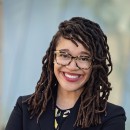 Ashley Cureton Quoted in the Boston Globe on How School Transfers Can Compound Trauma in Refugees
Ashley Cureton Quoted in the Boston Globe on How School Transfers Can Compound Trauma in RefugeesAssistant Professor Ashley Cureton was quoted in the Boston Globe about the struggles of Ukrainian refugee families. The article explores how multiple school transfers can uproot vulnerable kids and compound the trauma and loss they’ve already experienced as refugees. “It is imperative that they can stay in one place, that they can build those relationships, that they can build a sense of community, and really feel like they have a place here in the U.S.,” Cureton said.
- January 9, 2024
- Learn more »
- MSW Students Maryam Syed and Maretta DeWitt Named Dow Sustainability Fellows
MSW students Maryam Syed and Maretta DeWitt have been named as Dow Sustainability Fellow by the Graham Institute. Designed to support the next generation of sustainability leaders in business, government, and nonprofits, the Dow Sustainability Fellows Program is among the most prestigious and productive graduate programs at U-M. Fellows are selected through a competitive process from a pool of applicants nominated by their academic units.
- January 9, 2024
- Learn more »
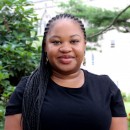 Greer Hamilton Named a Health Equity Early Career Scholar
Greer Hamilton Named a Health Equity Early Career ScholarResearch Fellow Greer Hamilton has been named to the 2023-24 cohort of the Health Equity Early Career Scholars Program, a collaborative effort of the Scholars Strategy Network and the Robert Wood Johnson Foundation. The program is structured to enable cohort members to disseminate their research findings among peers, senior scholars, policymakers and practitioners.
- January 9, 2024
- Learn more »
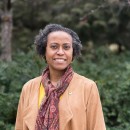 Trina Shanks Receives 2024 SSWR Social Policy Award
Trina Shanks Receives 2024 SSWR Social Policy AwardProfessor Trina Shanks has received the 2024 Society for Social Work and Research (SSWR) Social Policy Award. Shanks will be presented with the award this weekend at the SSWR Annual Conference in Washington, D.C. in January.
- January 9, 2024
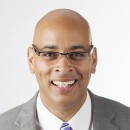 William Elliott Discusses College Savings Accounts with St. Louis Public Radio
William Elliott Discusses College Savings Accounts with St. Louis Public RadioProfessor William Elliott III joined St. Louis Public Radio in a spirited conversation about college savings accounts and their potential. The conversation was prompted by St. Louis Public Schools’ recent decision to pause its partnership in the College Kids Savings Account program.
- January 9, 2024
- Learn more »
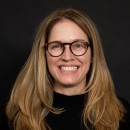 Shawna Lee Named Co-Editor-in-Chief of Children and Youth Services Review
Shawna Lee Named Co-Editor-in-Chief of Children and Youth Services ReviewProfessor Shawna Lee has been appointed as a new Co-Editor-in-Chief of Children and Youth Services Review.
“I am excited to take on the role of Co-Editor-in-Chief at Children and Youth Services Review. I look forward to working with the other editors to continue to increase the representation of BIPOC scholars, international scholars and junior scholars on the CYSR team,” said Lee. “One of the things that I appreciate about Children and Youth Services Review is its focus on children's experiences. The journal places children's experiences and the impact of policy and practice on children at the forefront. In so doing, CYSR centers youths' perspectives.”
- January 3, 2024
- Learn more »
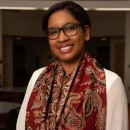 Jaclynn Hawkins Appointed New Curtis Center Director
Jaclynn Hawkins Appointed New Curtis Center DirectorAssociate Professor Jaclynn Hawkins was appointed the director of the Vivian A. and James L. Curtis Center for Health Equity Research and Training Center, effective January 2024. She has previously served as both associate director (2021-present) and acting director (2022-2023).
Hawkins received her PhD in Social Work and Sociology through the School’s Joint Doctoral Program in 2015 and joined the School faculty in 2018. She brings extensive experience in conducting research on health care disparities. Her research focuses on identifying the causes of physical health disparities between Black men and non-Hispanic white men, and creating and evaluating diabetes health interventions with an emphasis on addressing the unique needs of Black men. Much of her work focuses on the intersection of race, age and gender in diabetes diagnosis and self-management in Black men. She is the principal investigator of the Michigan Men’s Diabetes Project, the co-director of the Michigan Center for Diabetes Translational Research Pilot/Feasibility Program and an Institute for Implementation Science Scholar.
The Curtis Center is named in honor and recognition of the generous support of Dr. James Curtis, MD ’46, and his wife, Vivian Curtis, MSW ’48, who shared a lifetime of collaboration blending medicine and social work. They provide ongoing inspiration to make positive change possible.
Hawkins succeeds Professor Daphne Watkins, who directed the center from 2018-2023. Assistant Professor Anao Zhang is the new associate director.
- January 3, 2024
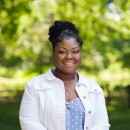 Daicia Price is the New SSW Diversity, Equity and Inclusion Program Director
Daicia Price is the New SSW Diversity, Equity and Inclusion Program DirectorClinical Associate Professor Daicia Price has been named the School’s Diversity, Equity and Inclusion (DEI) Program Director. Previously, she was the program’s co-director. As director, Price will lead the rollout and implementation of the DEI 2.0 plan.
Price joined the School faculty in 2016. She has clinical and macro practice experience in juvenile justice, community mental health, housing, schools and foster care, and is committed to sharing her personal and professional experiences and knowledge to support others. She engages with the community to disrupt and dismantle racism and oppression using a bioecological system and an African-centered framework.
Price has received numerous awards for her teaching and service including U-M’s Harold J. Johnson Diversity Service Award and the Provost’s Teaching Innovation Prize. In 2019, she was voted the School’s Teacher of the Year. She was honored by the Washtenaw Community College Foundation Women’s Council in 2022 for her significant contributions to the community.
- January 3, 2024
 Matthew Smith Appointed Associate Dean for Research
Matthew Smith Appointed Associate Dean for ResearchProfessor Matthew Smith was appointed the Associate Dean for Research, effective January 2024. In this role, he oversees the Office of Research, which supports faculty research endeavors, fosters a vibrant research culture, and ensures compliance with relevant policies.
Smith joined the School faculty in 2017. His research and scholarship focus on modifying and delivering behavioral interventions for a broad spectrum of vulnerable and underserved populations. He is the director of the Level Up: Employment Skills Simulation Lab, which develops and evaluates technology-based interventions to help obtain and sustain employment for people from marginalized and underserved communities. Specifically, Smith partners with members of the autism, mental health and returning citizen communities to develop employment-focused tools and evaluate them in real-world settings including high schools, community health agencies and prisons.
- January 3, 2024